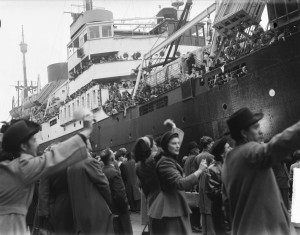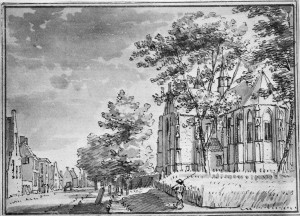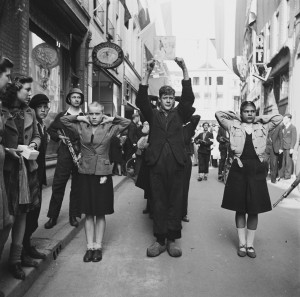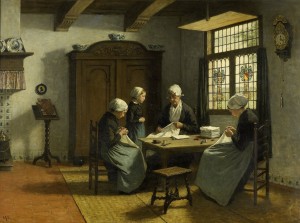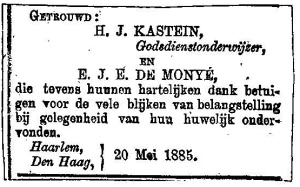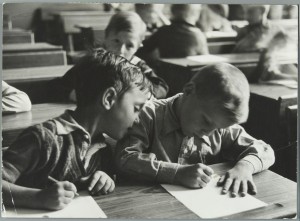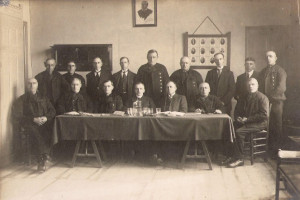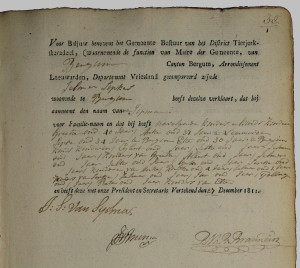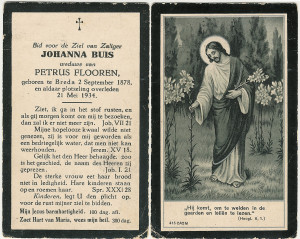In the 1840s, when religious tensions were high and crops were failing, many people left the Netherlands to start a new life in America. The national government wanted to know what was going on. Since 1848, they required each province to keep lists of emigrants, the "Staten van Landverhuizers" [tables of emigrants]. Between 1831 and 1847, only numbers were recorded, but since 1848 the heads of households were listed. Contents of the Staten van Landverhuizers The provincial lists were compiled … [Read more...]
Source – Baptismal record
Before 1811, baptismal records are the main source for information about an ancestor's birth date. Baptismal records should have been kept since the Trente council of 1545-1563, but for most areas they only survive since the early to mid 1600s. Most children were baptized within days of being born. In some churches, children were baptized the next Sunday. Others baptized them the same day, or may have waited several weeks. Anabaptists and similar religious only baptized adults, so in that … [Read more...]
Finding collaborators in World War II
With the 70th anniversary of our liberation coming up next week, I thought I would discuss one of the most important record groups for research into World War II. During World War II, several Dutch citizens collaborated with the German occupation: some joined the National Socialist Movement (NSB), others betrayed Jews or were romantically involved with German soldiers. After the War was over, hundreds of thousands of Dutch citizens were prosecuted for collaboration or treason. If convicted, … [Read more...]
Source – Guardianship records
In my article about the Weeskamer (orphan chamber), an institute that oversaw the estates of orphans before 1811, several people asked me what records might exist for later orphans. The richest source of information are guardianship records, which can be found in the records of the court. Court-appointed guardians After 1811, the courts oversaw the appointing of guardians. If one parent died, the surviving parent automatically became the guardian, without the need for the court to interfere. … [Read more...]
Source: Family announcements
In the Netherlands, there has never been a tradition of writing biographical obituaries like you see in countries like the United States. Instead, "familieberichten" [family announcements] simply announce the death of a person. In the 19th century, only more affluent people had a familiebericht placed in the paper. It was usually very short and only signed by the closest relative, typically the spouse or eldest son. In the 20th century, the announcements became a bit more informative and … [Read more...]
Sources for Dutch Genealogy – Pre 1811 Cheat Sheet
Looking for information about Dutch ancestors in the period from say 1650 until 1811 (before the introduction of the civil registration)? This cheat sheet will tell you which sources to consult. In some cases, not all types of records are available in each region. If a town did not have an orphan chamber, the administration of the estates of (half-)orphans was handled by the court. Not all regions had notaries, in which case voluntary legal actions were handled by the court as well. … [Read more...]
Sources for Dutch genealogy – post 1811 cheat sheet
Looking for information about Dutch ancestors in the 19th or 20th century (after the introduction of the civil registration)? This cheat sheet will tell you which sources to consult. … [Read more...]
Source: church council minutes
Protestant or Reformed churches have a church council that administers the church. The church council consists of the minister, the elders and deacons. Some churches also appointed guardians who were responsible for the management of the church estates. Especially in earlier centuries, the council was involved with all aspects of the lives of their parishioners, ranging from the baptisms of children to the admonishment of sinners. The minutes of the church council can be a real treasure … [Read more...]
Name taking records
The French occupation from 1795-1813 introduced many new types of administration, including the civil registration. To properly record people, it was necessary that they all had a last name. In 1811 and 1813, Napoleon decreed that everybody had to register their last name. After the French occupation ended, the Dutch government decided to keep the obligated last name. In 1825 they required that everybody who had not registered his name yet should do so. You can find information about … [Read more...]
Source: prayer cards
I vividly remember the first time I visited the Central Bureau for Genealogy in The Hague. I must have been about sixteen years old, and had just started doing genealogy. My mom also became interested and went with me. When we checked the catalog, we found that there was an envelope with prayer cards of people named Flooren, my grandmother's maiden name. Within minutes, we held the prayer card of Petrus Flooren, my three-times-great-grandfather. My mom and I were very excited about this find. … [Read more...]
